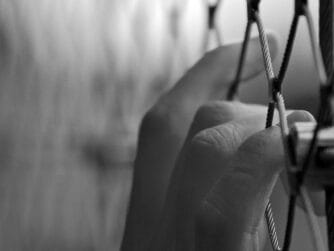Voice 1
Welcome to Spotlight. I’m Roger Basick.
Voice 2
And I’m Gillian Woodward. Spotlight uses a special English method of broadcasting. It is easier for people to understand, no matter where in the world they live.
Click here to follow along with this program on YouTube.
Voice 1
The boy was afraid that creatures from another planet were going to take over his mind. He had been reading a book for older children called Animorphs. In the book, these creatures called yeerks could climb into a person’s ear. The yeerks could control a person’s movement. But the person would still be aware inside. He would watch as the yeerks moved his body. He could not control his own body’s movements.
Voice 2
This idea was so troubling to the boy that he started to feel his ears for the creatures. He knew that yeerks did not exist. He understood the difference between a story world and the real world. But he was afraid whenever he thought about the yeerks. His fear went away only if he put his fingers in his ears to make sure the yeerks were not there. As time went on, he had to check many times each day before the fear went away. Some days it got so bad his ears bled.
Voice 1
This young boy had obsessive-compulsive disorder, or OCD. OCD is a disease of the mind. It is characterized by looping, fearful thoughts and repeated actions. Looping is a pattern of fearful thoughts. Sufferers often feel trapped. They feel caught in a repeating loop or series of thoughts and behaviors. But there is hope for people who have OCD! Today’s Spotlight is on obsessive compulsive disorder.
Voice 2
When most people use the phrase “OCD” in English, they are not talking about the real obsessive compulsive disorder. When they say someone is OCD, they mean someone is neat or likes to clean often. A person called OCD may be embarrassed by or particular actions. But this person does not truly have obsessive compulsive disorder. However, a person with real OCD diagnosis may sometimes feel the need to be neat or clean.
Voice 1
The truth is that OCD is a difficult disease to talk about. Each OCD sufferer has two different symptoms: obsessions and compulsions. An obsession is a thought – or series of thoughts – that a person with OCD cannot get rid of or stop thinking about. A compulsion is an action the person feels forced to do. Obsessions cause compulsions. And compulsions reinforce and continue obsessive behavior.
Voice 2
OCD affects each individual in different ways. Like the boy from the introduction, an OCD sufferer may have the need to check something over and over again. He may clean obsessively because he fears the dirt will make him sick. He may avoid crowds because he is afraid he will hurt someone. He may pull his hair until the skin has turned red and clumps of hair are in his hands. He may visit his place of worship over and over again, afraid he has done something that will anger his God. He may do all of these things or only one of these hour after hour after hour, day after day after day.
Voice 1
These are outer signs of OCD behavior. This is what most people see. But the disorder is best described as a process that takes place in the mind.
Voice 2
Each obsession starts with a random thought. Most people have thoughts like these. Strange ideas appear in the mind that might be troubling. Most people dismiss these thoughts without thinking about these too much. But a person with OCD is not able to forget these thoughts. These ideas cause fear. The more she tries to push the thoughts away, the more these thoughts will appear. She may think that there must be something wrong with her because she is having these thoughts.
Voice 1
A compulsion is a way to get rid of the fear of these thoughts. It is a way to do something to control an OCD sufferer’s fears. But compulsions do not stop the fear from returning. Instead, acting to get rid of the fear caused by the obsessive thought teaches the brain that there really is something to fear. When the thought comes back, the sufferer performs the compulsion again to make the fear go away. But over time, he will need more compulsive actions before the fear goes away. The fearful thoughts keep coming back. The more he tries to get rid of them, the worse these thoughts become.
Voice 2
Doctor Christopher Pittenger is the director of the Yale School of Medicine’s OCD research office. He told National Public Radio:
Voice 3
“All of us get thoughts like this. All of us do things to control our fears. OCD is when those get to such a point that they start to take over. It is then these thoughts get in the way of people’s ability to live their lives.”
Voice 1
There are many different ways that OCD shows itself. It will be a little different for each person who suffers from it. One of the most common but often misunderstood OCD experiences is having obsessive thoughts about harm.
Voice 2
Matt has OCD and suffers from this issue. When he was twelve, he saw a knife on the kitchen table. He wondered if he was going to use it to harm himself. He went to the train station. But he would avoid going near the train. He was afraid he would jump in front of the train! He told The Conversation:
Voice 4
“I did not feel like I wanted to kill myself. I really enjoyed my life. I just had an intense fear of doing something to hurt myself.”
Voice 1
Matt’s thoughts are normal for someone suffering from OCD. The fears he has often have little to do with reality. But the fear makes him question himself. He does not want to hurt himself. But what if there is something in him that does? Something out of his control? What if he reaches out and grabs the knife without knowing it?
Voice 2
These obsessions can be truly destructive. Combined with untreated compulsions, the disorder can ruin a person’s life. The World Health Organization lists OCD as one of the most disabling diseases in the world. OCD can also lead to other mental disorders like depression.
Voice 1
But having OCD is not the end. Many people have OCD and live successful lives. John Bunyan was an English writer. His obsessive-compulsive disorder drove him to write the book The Pilgrim’s Progress. This Christian book is one of the greatest examples of English literature from the seventeenth century. It remains a favorite book of many readers today. David Beckham, one of the most decorated football players in the world, has OCD. He obsessively cleans and organizes his home while the rest of his family is asleep. American celebrities Katy Perry and Lena Dunham also suffer from the condition. The International OCD Foundation estimates that 150-200 million people worldwide suffer from OCD.
Voice 2
The good news about OCD is that it is treatable. Different medications can reduce fears and obsessive behaviors. Mental health providers and therapists are trained to help reduce compulsions. One helpful resource for OCD is called exposure and response therapy, or ERP. In ERP, a therapist exposes an OCD sufferer to situations that trigger obsessive thoughts. The OCD patient will want to react, to perform the compulsion. But the patient should not. ERP means not reacting to fear until the fear goes away.
Voice 1
ERP teaches that obsessions are just thoughts. These thoughts do not mean anything more than other thoughts. The fear that follows does not make those thoughts any more important. Not reacting to these fears teaches the body that the thought is not worth fearing. This is called response prevention. Tracy Ibrahim works with NOCD, a provider of OCD treatment. She said:
Voice 5
“The important thing about response prevention is not escaping the obsession. You are not trying to escape or act. Acting tends to be compulsive. Response prevention can be as simple as not doing anything. You just let the obsession live, see that it is there, and not judge it.”
Voice 2
OCD never really goes away. In moments of stress, a sufferer often falls back on acting compulsively. But she can learn to be better. She can know that the world of obsessions is not worth fearing.
Voice 1
Mental illness can be both good and bad. Do you know anyone with mental illness? How does this person struggle with it? How does it affect this person’s life? How may you offer support and encouragement to someone with mental illness? You can leave a comment on our website at www.spotlightenglish.com. You can also find us on YouTube, Facebook, Tiktok, and X. You can also get our programs delivered directly to your Android or Apple device through our free official Spotlight English app.
Voice 2
The writer of this program was Dan Christmann. The producer was Michio Ozaki. The voices you heard were from the United States and the United Kingdom. All quotes were adapted for this program and voiced by Spotlight. This program is called, ‘Obsessive-Compulsive Disorder’.
Voice 1
We hope you can join us again for the next Spotlight program. Goodbye.
Question
Do you know anyone with mental illness? How does this person struggle with it? How does it affect this person’s life? How may you offer support and encouragement to someone with mental illness?








Yes, he cleaned his hand 10 times in a day that caused health issues in his body so, encouraged him to not react it and respect with fear to do something interesting
I would like to tell you a real story that I used to be. I haven’t known why I was addicted to it until now. That is I used to play game both online and offline a lot. Although my mind told me that I should stop it immediately at that time. I couldn’t put it away though. I played it all the time when I was a student. It seemed there is someone try to put some heroine in my foods and drinks I thought.
After many years trying to get rid of playing those stupid games, I nearly dismiss it in my life.
Be positive to think of something good in our life.
English is my second language. It’s meaningful to study it and feel like I find out my own path.
Is this able to be called OCD? Can you give me some advice?
I would like to make friends with you all through my Facebook “Hoang Quoc Hien”. We can talk with each other to improve English skills. It will be challenging I think.
Hello,
Yes, I do know someone with mental illness, the thing is that, unlike people with OCD who focus on cleaning and orginizing, he believes that dirtiness acts as a protective layer that prevents germs, bacteria and viruses from getting in. He also thinks the scent he gives off helps protect him from illness.
Hey
I know one who have ment illness
Me, i have an OCD through genetic inheritance, iam suffering especially at time of stress, it attacks me in talking form
Like i say somthimg many times because i feel i didn’t say it perfectly
Anyway, OCD isnt only obsession thoughts and compulsions
OCD affects the other impacts of life like yous reactions, your relationships, your thoughts about many things in your life
And your wellbeing
It makes the process of healing difficult
Ocds will make thousands of schedules and plans, but they stop there
Without any progress
I hope to get better and break the chain of these thoughts
For me and all suffering OCDs
Thanks
okay first of all ,it happen when I was a child my mom had a congental problem in her heart I think Mitral valve prolapse so the cradiologist prescribed some medicines for her codition but after that she strated to feel abnormal and she changed Mentally beacuse she is a general doctor she directly link what happened to thoses medicines that cradiologist had prescribed to , she suffered from serises of bad and worse thoughts like Suicide, Self-harm but she decided to see a Psychiatrist and thanks GOD she is being-well after treatment and my father ,I, and My siblings supported her until she became okay and has fully recovered